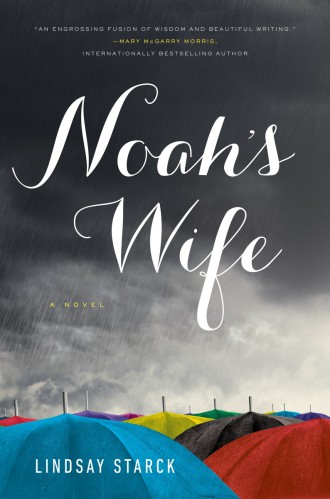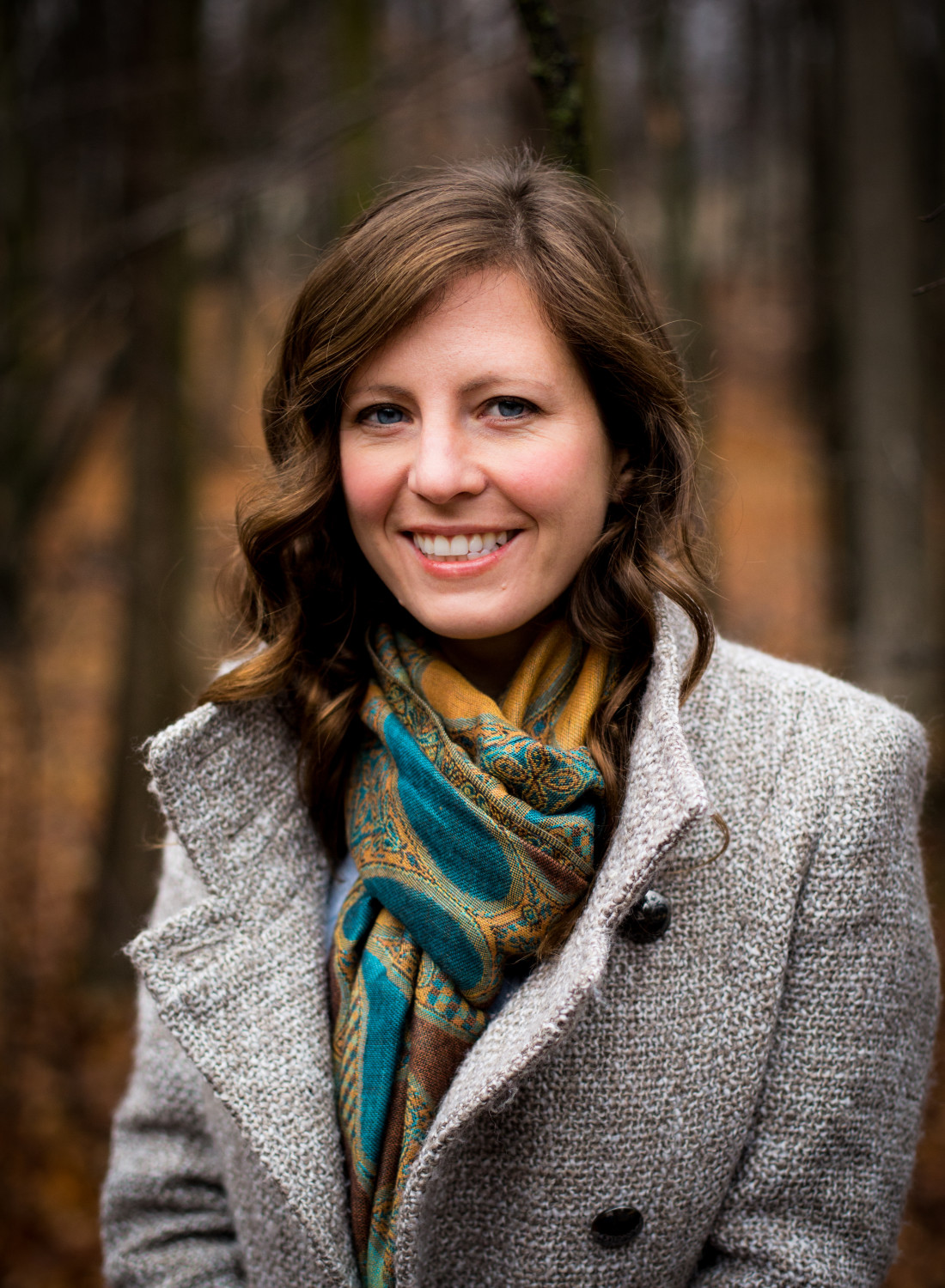Chapel Hill-based author Lindsay Starck took on epic subject matter for her debut novel: The biblical story of Noah. But rather than the ark, it’s his spouse who captured Starck’s imagination. In Noah’s Wife, the author reframes the characters of the Hebrew narrative in the modern day, as a couple relocated to a new town. Stack’s Noah is a minister sent to lead a congregation in a place where weird weather patterns have brought nonstop rain for years. Noah’s wife, initially just a supporter of her husband’s work, finds her own purpose in creating community where faith and hope have been abandoned.
Stark presents her book at Malaprop’s Thursday, Jan. 28.
Xpress: Noah’s wife doesn’t have a name in the novel — she’s just referred to by her relationship to others. I’m guessing you did this because she isn’t named in the Bible, but was it hard to develop a character without knowing her name?
Lindsay Starck: Oddly enough, thinking of her as “Noah’s wife” helped me to write about her because it gave me a clear idea of how she understood her position in the world and her relationship to other people. She’s a minor character in the biblical story, which puts her in a supporting role. I imagined that she was comfortable in this role, that she understood it, and that her struggle over the course of the novel would be to redefine herself as an individual — and as a protagonist.
The premise of the novel is the idea that a person’s status as a “major” or “minor” character is merely a matter of perspective; everyone has his or her own storyline, even if there isn’t any record of it. My job, as I saw it, was to provide a record for Noah’s wife. As I wrote, I wondered: What does it mean to play a supporting role to someone else? How much of our identities are defined by other people? How do we understand ourselves outside of those relationships?
What were some of the challenges with adapting (at least in part) a biblical tale to a modern setting?
Because the original story is so minimalist, I felt I had a great deal of creative freedom. There are no descriptions of anyone, not a lot of backstory, very little setting, and so I could imagine my characters and their town in any way I pleased. I never intended for the book to be a direct allegory or a straight retelling of the biblical tale… Instead, in Noah’s Wife I engage with many of the themes (faith, doubt, destruction, renewal) and imagery (animals, rain, boats, doves) of the original story in order to create something new. It’s a story about human relationships, not divine ones; it’s about faith, yes, but it’s about faith in other people, faith in community.
Have you adapted or drawn inspiration from any other bible stories or fables?
Although I haven’t written anything else directly adapted from another story, I like to think that books are always inspired by other books. One of the most interesting short story collections I’ve read over the past year is Kate Bernheimer’s XO Orpheus, an anthology of fiction written by authors who are reworking ancient myths. I love this concept because I’m very interested in how works of literature speak with and through one another. The best adaptations reveal something new, something we hadn’t seen before in the original.
 What was the original idea or event that sparked this book?
What was the original idea or event that sparked this book?
When I began writing this novel, I was in my mid-20s, and my friends and colleagues were beginning to pair off. As I watched people navigate the tumultuous waters of romance and friendship, I wondered over the nature of “pairings” more generally. What makes a marriage work? Why do some friendships fall apart, while others last for decades? What qualities make a good mother, a good daughter, a good neighbor?
The idea of “pairs,” along with my conviction that the flood story was darker and more complex than it often appears to be in popular culture, led me to Noah — and from there, to his wife. What sort of woman, I wondered, would be willing to abandon her community and follow her husband into a giant floating zoo? What if she were afraid of reptiles or allergic to feathers? How could she continue to believe in Noah, if she could not see the signs that he saw? If she were given a voice, what would she say?
The rain that continues through the story feels oppressive. What was it like, as a writer, to immerse yourself in the idea of that gray and soggy place for so long?
As Noah’s wife would say (in her optimistic way), there’s “a certain beauty” to the rain—and of course water imagery comes with a long tradition of symbolism, which I enjoyed thinking over and reworking. So it wasn’t as depressing as one might think! Still, one reason I included the “Dr. Yu” sections was because I did need to get out of the rain every couple of chapters (and I thought my readers might also appreciate the reprieve). It was refreshing to take a break to write about sun and shadows and wind without worrying about water rushing through gutters or pounding against windowpanes.
I’ll probably avoid writing about rain in my next novel. I’ve exhausted every possible way I can think of to describe it!
Did you do anything (watch rainy movies, run water while you were writing, visit Seattle) to cultivate the mood?
Ha! Great question. I thought a lot about the novel while swimming laps, actually — so perhaps that helped. Above my desk, I tacked newspaper clippings about the zoo floodings in Calgary (2013) and Minot, North Dakota (2011). Articles like this one from The New York Times (I love that its title references the ark) illustrated the terrible destruction of modern-day floods while also managing to include some lighthearted descriptions of the animals. That’s what I wanted my animals, to do, too: provide some moments of levity in an otherwise dark story.
What brought you to North Carolina, and are you inspired by the literary history and/or community of N.C.?
Graduate school! I’m finishing up a degree in comparative literature at UNC-Chapel Hill. And yes, the renowned literary community in the state was a huge draw for me. I admire the strong tradition of storytelling in the region, and I’ve found fellow writers in North Carolina to be generous, warm, and genuinely invested in each other’s work. Daniel Wallace in particular has provided a great deal of encouragement and support. As Georgann Eubanks (author of Literary Trails in the North Carolina Mountains) points out in this interview with UNC Press, the state offers a wonderful fusion of natural beauty, local community, and a commitment to education and the arts.
My favorite anthology of North Carolina writers is Long Story Short, a collection of flash fiction edited by Marianne Gingher. I’ve also had the fantastic opportunity to work as an editor of The Carolina Quarterly, where I’ve been inspired by the talented new voices we publish as well as my fellow editors’ commitment to contemporary literature—for all of us, it’s a labor of love.
Are you teaching writing in Chapel Hill?
Yes. I teach writing (both composition and creative writing) as well as literature and film—and sometimes Italian, which is a lot of fun. What I like about teaching writing is how much I learn about my students’ experiences and perspectives on the world through their fiction. By reading and by writing, I believe, we become more empathetic. We practice getting into others’ minds and we try to see situations through others’ eyes. For me, that’s the whole point of literature.
What are you currently working on?
I’m finishing up a dissertation on modernist literature, social networks, and gossip. After that, it will be on to the next novel!
WHO: Lindsay Starck presents Noah’s Wife
WHERE: Malaprop’s, malaprops.com
WHEN: Thursday, Jan. 28, 7 p.m. Free



Before you comment
The comments section is here to provide a platform for civil dialogue on the issues we face together as a local community. Xpress is committed to offering this platform for all voices, but when the tone of the discussion gets nasty or strays off topic, we believe many people choose not to participate. Xpress editors are determined to moderate comments to ensure a constructive interchange is maintained. All comments judged not to be in keeping with the spirit of civil discourse will be removed and repeat violators will be banned. See here for our terms of service. Thank you for being part of this effort to promote respectful discussion.